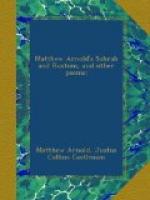=147. teen=. Grief, sorrow; from the old English teona, meaning injury.
=149. the just-pausing Genius=. Does the author here allude to death?
=151. Thou hast not lived= (so). That is, as described in preceding stanza.
=152. Thou hadst one aim=, etc. What was the Scholar-Gipsy’s one motive in life?
=157-160. But thou possessest an immortal lot=, etc. Explain.
=165. Which much to have tried=, etc. Which many attempts and many failures bring.
=180. do not we ... await it too=? That is, the spark from heaven. See l. 171.
=182-190=. Possibly Carlyle, although the author may have had in mind a type rather than an individual.
=208-209. Averse, as Dido did=, etc.
Dido, the mythical queen of
Carthage, being deserted by her lover AEneas, slew
herself. She
afterward met him on his journey through Hades, but
turned from him in
scorn.
[201]
“In
vain he thus attempts her mind to move
With
tears and prayers and late repenting love;
Disdainfully
she looked, then turning round
But
fixed her eyes unmoved upon the ground,
And
what he says and swears regards no more
Than
the deaf rocks when the loud billows roar.”
—DRYDEN’S
Translation.
For entire episode, see AEneid, vi, 450-476.
=212. inviolable shade=. Holy, sacred, not susceptible to corruption. Perhaps no other of Arnold’s lines is so much quoted as this and the preceding line.
=214=. Why “silver’d” branches?
=220=. dingles. Wooded dells.
=231-250=. Note the force of this elaborate and exquisitely sustained image; how the mind is carried back from these turbid days of sick unrest to the clear dawn of a fresh and healthy civilization. In the course of an essay on Arnold, the late Mr. Richard Holt Hutton says of this poem and this closing picture: “That most beautiful and graceful poem on the Scholar-Gipsy (the Oxford student who is said to have forsaken academic study in order to learn, if it might be, those potent secrets of nature, the traditions of which the gypsies are supposed sedulously to guard) ends in a digression of the most vivid beauty.... Nothing could illustrate better than this [closing] passage Arnold’s genius and his art.... His whole drift having been that care and effort and gain and pressure of the world are sapping human strength, he ends with a picture of the old-world pride and daring, which exhibits human strength in its freshness and vigor.... I could quote poem after poem which Arnold closes by some such buoyant digression: a buoyant digression intended to shake off the tone of melancholy, and to remind us that the world of imaginative life is still wide open to us.... This problem is insoluble, he seems to say, but insoluble or not, let us recall the pristine force of the human spirit, and not forget that we have access to great resources still.... Arnold, exquisite as his poetry is, teaches us first to feel, and then to put by, the cloud of mortal destiny. But he does not teach us, as Wordsworth does, to bear it.” [202]




